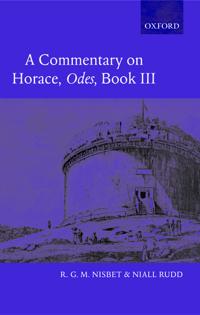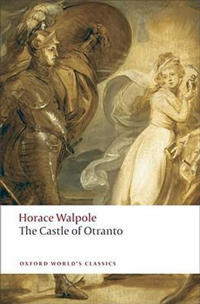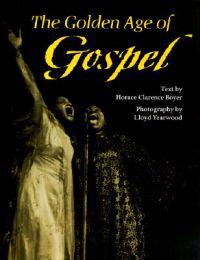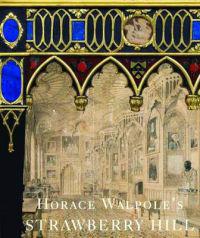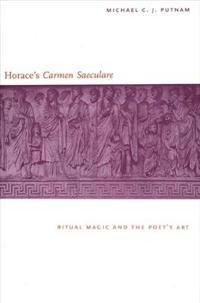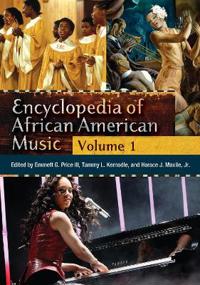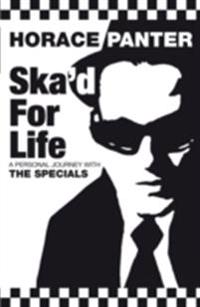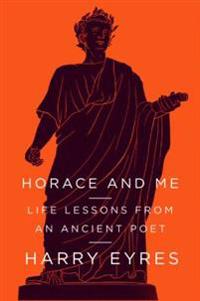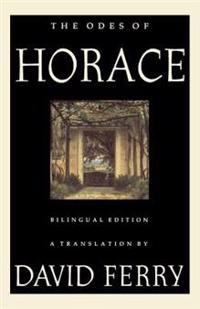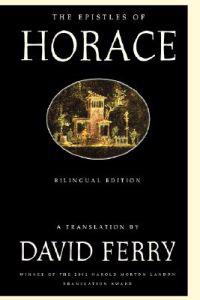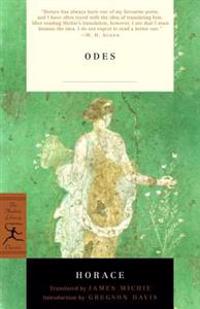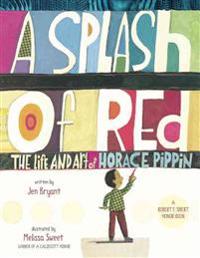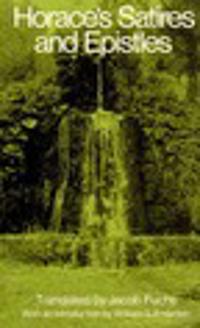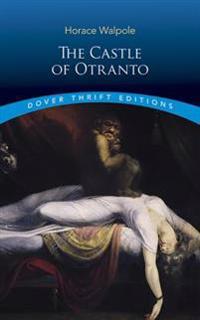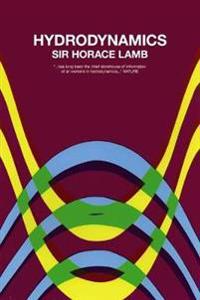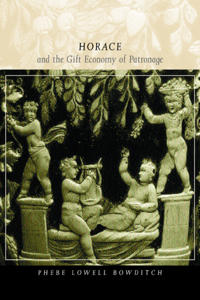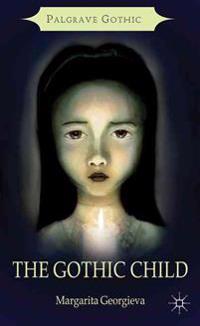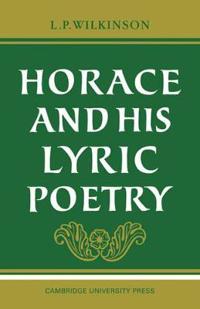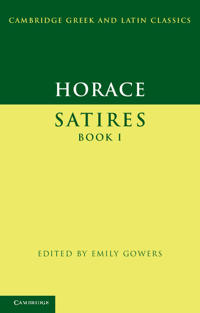A Commentary on Horace: Odes Book III (Pocket)
avR. G. M. Nisbet, Niall Rudd, R. G. M. Nisbet
ISBN: 9780199288748 - UTGIVEN: 2007-04This book is a successor to the commentaries by Nisbet and Hubbard on Odes I and II, but it takes critical note of the abundant recent writing on Horace. It starts from the precise interpretation of the Latin; attention is paid to the nuances implied by the word-order; parallel passages are quoted, [...]
The Castle of Otranto (Häftad)
avHorace Walpole
ISBN: 9780199537211 - UTGIVEN: 200808First published pseudonymously in 1764, The Castle of Otranto purported to be a translation of an Italian story of the time of the crusades. In it Walpole attempted, as he declared in the Preface to the second edition, 'to blend the two kinds of romance: the ancient and the modern'. He gives us a se[...]
The Complete Odes And Epodes (Pocket)
avHorace
ISBN: 9780199555277 - UTGIVEN: 2008-10-09This is a superb new translation of the great Augustan poet Horace's Odes and Epodes - brilliantly crafted and diverse poems of politics, friendship, love, and wine. The edition is supplemented by a lucid introduction, extensive notes, and glossary of names.[...]
Satires And Epistles (Pocket)
avHorace
ISBN: 9780199563289 - UTGIVEN: 2011-03-22Horace exposes the vices and follies of his Roman contemporaries in his Satires, and the Epistles include the famous Art of Poetry, whose advice on poetic style influenced many later writers and dramatists. John Davie's new prose translations perfectly capture the ribald style of the original.[...]
Black Metropolis (Pocket)
avSt. Clair Drake, Horace Roscoe Cayton
ISBN: 9780226162348 - UTGIVEN: 1993-08-01The Golden Age of Gospel (Häftad)
avHorace Clarence Boyer
ISBN: 9780252068775 - UTGIVEN: 200006'Professional gospel performer, composer, and scholar Horace Clarence Boyer presents the first definitive history of the vibrant, visceral tradition of black gospel music. Originally published as "How Sweet the Sound", this authoritative work is beautifully illustrated with Lloyd Year wood's arresti[...]
Horace (häftad)
ISBN: 9780300045734 - UTGIVEN: 1990-03Horace (65-8 BC), a freedman's son who became the great poet of the court of Augustus, author of satires, epodes, epstles, four books of odes, and the Carmen Saeculare. Biographical and literary study. Hermes series on classical authors.[...]
Horace Walpole's Strawberry Hill (Inbunden)
ISBN: 9780300125740 - UTGIVEN: 2009-10Horace Walpole (1717-1797), as the youngest son of the powerful Whig minister Robert Walpole, grew up at the centre of Georgian society and politics and circulated amongst the elite literary, aesthetic, and intellectual circles of his day. His brilliant letters and writings have made him the best-kn[...]
Horace's "Carmen Saeculare" (Häftad)
avMichael C. J. Putnam
ISBN: 9780300182668 - UTGIVEN: 201109This is the first book devoted to Horace's Carmen Saeculare, a poem commissioned by Roman emperor Augustus in 17 B.C.E. for choral performance at the Ludi Saeculares, the Secular Games. The poem is the first fully preserved Latin hymn whose circumstances of presentation are known, and it is the only[...]
Encyclopedia of African American Music 3 Volume Set (Inbunden)
avEmmett G., III Price, Tammy L. Kernodle, Horace J., Jr. Maxile
ISBN: 9780313341991 - UTGIVEN: 201012Ska'd for Life (Häftad)
avHorace Panter
ISBN: 9780330440738 - UTGIVEN: 200802As bass player with the specials, in his second-hand suit and pork pie hat, Horace Panter was a member of one of the most innovative and exciting bands to come snarling out of the punk era. Founded by Jerry Damners, their fusion of punk, reggae and ska created a new musical fashion, spearheaded by t[...]
Horace and Me: Life Lessons from an Ancient Poet (Inbunden)
avHarry Eyres
ISBN: 9780374172749 - UTGIVEN: 201306A wise and witty revival of the Roman poet who taught us how to carpe diem
What is the value of the durable at a time when the new is paramount? How do we fill the void created by the excesses of a superficial society? What resources can we muster when confronted by the inevitability of death? F[...]The Odes of Horace: Bilingual Edition (Häftad)
avDavid Ferry
ISBN: 9780374525729 - UTGIVEN: 1998-10The Latin poet Horace is, along with his friend Virgil, the most celebrated of the poets of the reign of the Emperor Augustus, and, with Virgil, the most influential. These marvelously constructed poems with their unswerving clarity of vision and their extraordinary range of tone and emotion have de[...]
The Epistles of Horace: Bilingual Edition (häftad)
ISBN: 9780374528522 - UTGIVEN: 2002-09"My aim is to take familiar things and make"
"Poetry of them, and do it in such a way"
"That it looks as if it was as easy as could be"
"For anybody to do it . . . the power of making"
"A perfectly wonderful thing out of nothing much."
--from "The Art of Poetry" When David Ferry's tra[...]Odes (Pocket)
avHorace, James (TRN) Michie, Gregson (INT) Davis
ISBN: 9780375759024 - UTGIVEN: 2002-02A Splash of Red: The Life and Art of Horace Pippin (Inbunden)
avJennifer Bryant, Jen Bryant, Melissa Sweet
ISBN: 9780375967122 - UTGIVEN: 201301As a child in the late 1800s, Horace Pippin loved to draw: "He loved the feel of the charcoal as it slid across the floor. He loved looking at something in the room and making it come alive again in front of him." He drew pictures for his sisters, his classmates, his co-workers. Even during W.W.I, H[...]
Horace's Satires and Epistles (Häftad)
avQuintus Horatius Flaccus
ISBN: 9780393090932 - UTGIVEN: 197704Early in his life, and again in maturity, Horace sought to turn his poetic skills to the uses of moral and aesthetic discussion in the series of didactic works translated here. In the Satires, Horace adopts one persona after another, each of which reduces himself to absurdity in the process of tryin[...]
The Three Gothic Novels (Häftad)
avHorace Walpole, William Beckford, John Polidori
ISBN: 9780486212326 - UTGIVEN: 199801Hydrodynamics (Pocket)
avHorace Lamb
ISBN: 9780486602561 - UTGIVEN: 1993-11This reissue of the classic 1932 edition is an indication of this work's lasting value. Constantly in use since its publication in 1892, it has proved to be the definitive reference for all fluid dynamicists. A new foreword highlights the prominence of the publication in the field.[...]
Horace and the Gift Economy of Patronage
ISBN: 9780520226036 - UTGIVEN: 2001-02This innovative study explores selected odes and epistles by the late-first-century poet Horace in light of modern anthropological and literary theory. Phebe Lowell Bowditch looks in particular at how the relationship between Horace and his patron Maecenas is reflected in these poems' themes and rhe[...]
Let's Get to the Nitty Gritty (Häftad)
avHorace Silver
ISBN: 9780520253926 - UTGIVEN: 2006-02Horace Silver is one of the last giants remaining from the incredible flowering and creative extension of bebop music that became known as 'hard bop' in the 1950s. This freewheeling autobiography of the great composer, pianist, and band leader takes us from his childhood in Norwalk, Connecticut, thr[...]
Horace and His Lyric Poetry
ISBN: 9780521095532 - UTGIVEN: 1951-06In this volume, first published in 1945, Mr Wilkinson writes primarily for students of the classics who are not Horatian specialists. His book falls easily within the scope of those who can read any Latin at all - and even of those who cannot, for most passages quoted are also translated. Horace - f[...]
Horace: Epodes (Häftad)
ISBN: 9780521397742 - UTGIVEN: 1995-10The Epodes, with the first book of the Satires, were Horace?s first published work. They consist of a collection of seventeen poems in different versions of the iambus, the metre traditionally associated with lampoon. David Mankin?s introduction and commentary examine all aspects of Horace?s relatio[...]
Horace: Satires Book I (Häftad)
ISBN: 9780521458511 - UTGIVEN: 2012-01Horace's first book of Satires is his debut work, a document of one man's self-fashioning on the cusp between republic and empire, and a pivotal text in the history of Roman satire. It wrestles with the problem of how to define and assimilate satire and justifies the poet's own position in a suspici[...]

